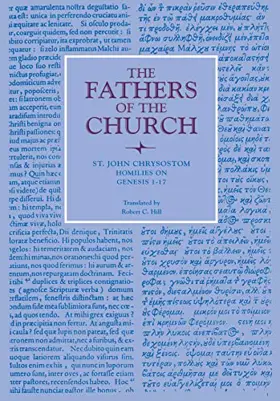


Homilies on Genesis
Homilies on Genesis, Volume 1: Homilies 1–17
Pages
246
Publisher
Catholic University of America Press
Published
1/1/1986
ISBN-13
9780813209722
Homilies on Genesis, Volume 3: Homilies 46–67
Pages
288
Publisher
Catholic University of America Press
Published
1/1/1992
ISBN-13
9780813214962
Homilies on Genesis, Volume 2: Homilies 18–45
Pages
483
Publisher
Catholic University of America Press
Published
1/1/1990
ISBN-13
9780813210872
This translation makes available for the first time in English one of the most significant Old Testament commentaries of the patristic period. St. John Chrysostom's extant works outnumber those of any other Father of the East; in the West, only Augustine produced a larger corpus. Of Chrysostom's more than 600 exegetical homilies, however, only those on the New Testament have previously been translated into English.
The Genesis homilies, his richest Old Testament series, reveal a theologian, pastor, and moralist struggling to explain some of the most challenging biblical material to his congregation in Antioch. He admonishes them to "apply yourself diligently to the reading of Sacred Scripture, not only when you come along here, but at home," encourages spiritual discourse, and frequently envisages them leaving church reminiscing on the day's sermon. While critical exegetical details go without mention and Chrysostom was limited to the Greek version of the Old Testament in his studies, his oratory has been judged golden and his theology profound. He was a preacher satisfied with commenting on Scripture with his moral purpose always to the fore.
Chrysostom studied the Scriptures with Diodore of Tarsus, a distinguished exegete known from fragments of his commentaries on Genesis and Psalms, and a polemic style developed from his pastoral concern to protect his congregation from the dangerous influences of fourth-century Antioch. Most importantly, he shared the Antiochene school's insistence on the literal sense of Scripture and their unwillingness to engage in allegorical interpretation. As such, his Genesis homilies constitute a milestone in the history of biblical interpretation.
The Genesis homilies, his richest Old Testament series, reveal a theologian, pastor, and moralist struggling to explain some of the most challenging biblical material to his congregation in Antioch. He admonishes them to "apply yourself diligently to the reading of Sacred Scripture, not only when you come along here, but at home," encourages spiritual discourse, and frequently envisages them leaving church reminiscing on the day's sermon. While critical exegetical details go without mention and Chrysostom was limited to the Greek version of the Old Testament in his studies, his oratory has been judged golden and his theology profound. He was a preacher satisfied with commenting on Scripture with his moral purpose always to the fore.
Chrysostom studied the Scriptures with Diodore of Tarsus, a distinguished exegete known from fragments of his commentaries on Genesis and Psalms, and a polemic style developed from his pastoral concern to protect his congregation from the dangerous influences of fourth-century Antioch. Most importantly, he shared the Antiochene school's insistence on the literal sense of Scripture and their unwillingness to engage in allegorical interpretation. As such, his Genesis homilies constitute a milestone in the history of biblical interpretation.
Collections
This book appears in the following featured collections.
- Pre-Modern Commentaries by Matt Quintana